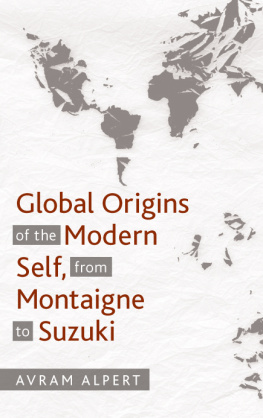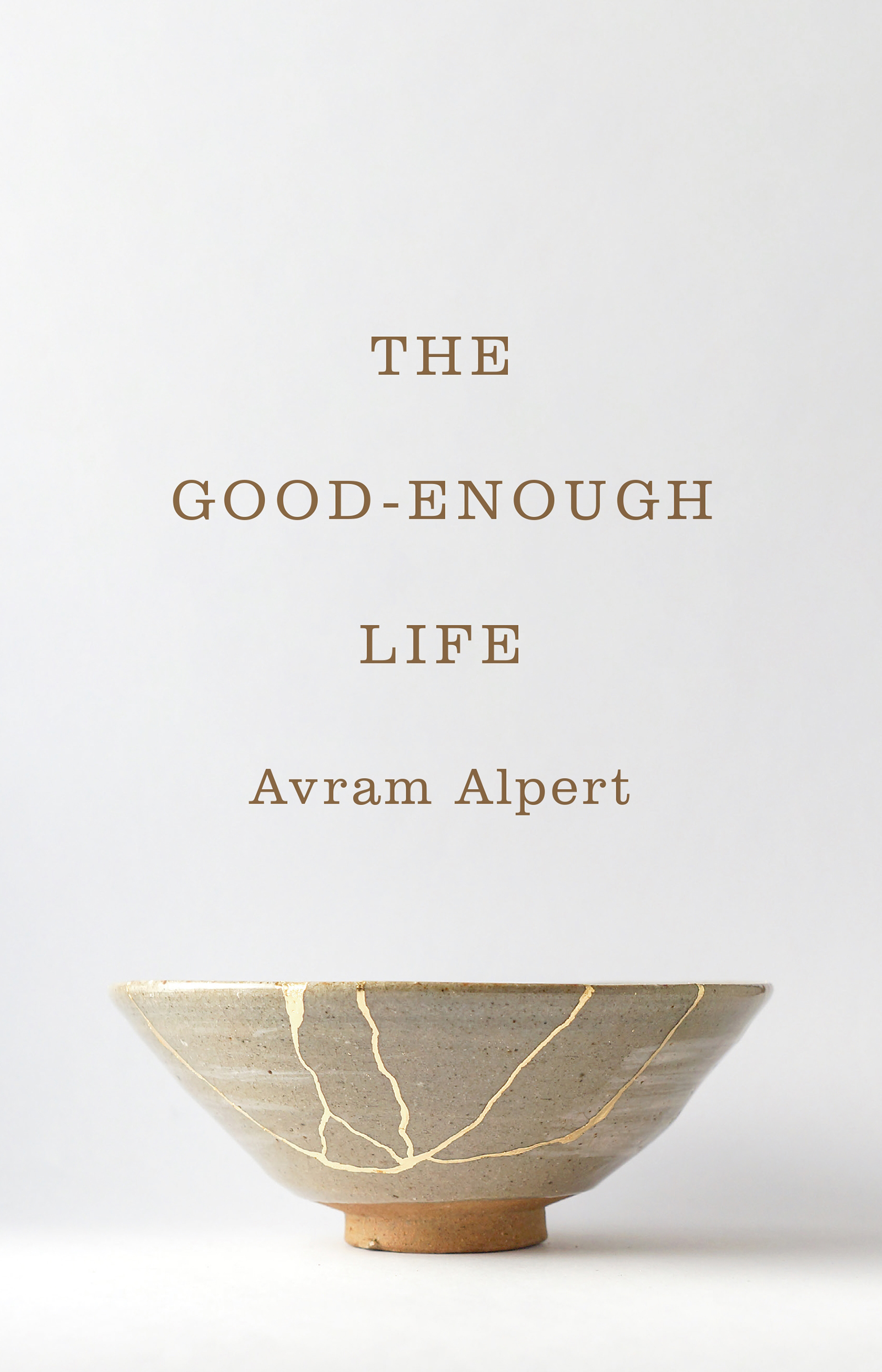THE GOOD-ENOUGH LIFE
THE GOOD-ENOUGH LIFE
Avram Alpert
PRINCETON UNIVERSITY PRESS
PRINCETON AND OXFORD
Copyright 2022 by Princeton University Press
Princeton University Press is committed to the protection of copyright and the intellectual property our authors entrust to us. Copyright promotes the progress and integrity of knowledge. Thank you for supporting free speech and the global exchange of ideas by purchasing an authorized edition of this book. If you wish to reproduce or distribute any part of it in any form, please obtain permission.
Requests for permission to reproduce material from this work should be sent to
Published by Princeton University Press
41 William Street, Princeton, New Jersey 08540
99 Banbury Road, Oxford OX2 6JX
press.princeton.edu
All Rights Reserved
Library of Congress Cataloging-in-Publication Data
Names: Alpert, Avram, 1984 author.
Title: The good-enough life / Avram Alpert.
Description: Princeton : Princeton University Press, [2022] | Includes bibliographical references and index.
Identifiers: LCCN 2021038381 (print) | LCCN 2021038382 (ebook) | ISBN 9780691204352 (hardcover) | ISBN 9780691204345 (ebook)
Subjects: LCSH: Self-realization. | Ability. | Conduct of life. | BISAC: PHILOSOPHY / Social | SELF-HELP / Personal Growth / General
Classification: LCC BF637.S4 A5875 2022 (print) | LCC BF637.S4 (ebook) | DDC 158.1dc23/eng/20211109
LC record available at https://lccn.loc.gov/2021038381
LC ebook record available at https://lccn.loc.gov/2021038382
Version 1.0
British Library Cataloging-in-Publication Data is available
Editorial: Anne Savarese, James Collier
Production Editorial: Terri OPrey
Text Design: Karl Spurzem
Jacket/Cover Design: Karl Spurzem
Production: Erin Suydam
Publicity: Jodi Price, Carmen Jimenez
Copyeditor: Jodi Beder
Jacket image: Japanese pottery restored using kintsugi technique.
Credit: Marco Montalti / Shutterstock
CONTENTS
- 17
- 19
- 22
- 26
- 30
- 33
- 35
- 38
- 46
- 48
- 52
- 62
- 70
- 74
- 78
- 86
- 100
- 105
- 109
- 111
- 116
- 118
- 122
- 124
- 130
- 145
- 152
- 161
- 166
- 170
- 184
- 195
- 203
- 207
- 213
- 216
- 221
- 227
- 231
- 233
- 241
- 243
- 283
- 311
THE GOOD-ENOUGH LIFE
Introduction
I used to aspire to greatness. When I was young, greatness meant wealth, and I wanted to find a way to be very rich. My first thought was to become a stockbroker, even though I didnt really know what that meant. Later, when I became obsessed with sports, I decided that my path to wealth should be as a famous athlete. I dreamed about playing basketball professionally, then tennis and baseball, but I never had enough talent for any of these.
Toward the end of high school and into my college years, I started to think of greatness as fame more than wealth. At first, I wanted to be a world-renowned fiction writer who was showered with prizes. Realizing how hard that would be to achieve, and (incorrectly) thinking that an academic life would be stabler, I went to graduate school, where I hoped to become one of those famous professors who was flown around the world to give prestigious lectures. I have come closer to achieving this goal than any of my previous professional plans, but it hasnt made me any more satisfied or happier. I think thats because while all of these different life goals have different values attached to them, they share the same basic aspiration: to become a member of the elite, sitting atop a social pyramid.
Over the last few years, Ive come to think that this desire to be at the top is poisonous for ourselves, our relationships, our societies, and our planeteven for the individuals who do make it. And so, as much as I can, Ive begun to work against these aspirations. Im not saying I dont still find them appealing. Of course I do. I dont know if Ill ever set foot on an airplane without wishing I were sitting in the luxury of first class, or go to an event and not wish I were one of the luminaries on the stage. And of course I am still exercising and writing to the best of my abilities. What I have come to doubt is not the desire to do something well for its own sake, nor even the appeal of winning. Instead, I question the social order that takes our talents and turns them into a desire to win our spot at the top of competitive hierarchies. In fact, as I argue in this book, I have come to think that personal quests for greatness, and, perhaps even more important, the unequal social systems that fuel these quests, are at the heart of much that is wrong in our world.
Ill go into more detail about what precisely is wrong in the course of this book, but to get a rough sense of what I mean, consider a fundamental paradox of our present condition: there is too much, and yet there is not enough. We live amid unprecedented abundance and productive capacity, yet billions go unfed, unclothed, and uncared for. Thus, in a world that has a combined $399.2 trillion in wealth, more than 3.4 billion people still live on less than $5.50 a day, while 34.5 million people a year die from a lack of adequate healthcare, and around 9 million more pass away due to hunger.
These trends are all related. When we live in a world where some have too much and many have too little, there is tremendous pressure to either rise to the top or sink to the bottom. And in such a world, we will feel anxious at our prospects, depressed at our situation, alienated from our fellow competitors, and unconcerned with how we damage the environment if doing so feels like the only way to stay alive.
To get beyond the paradoxes caused by the pursuit of greatness, we have to understand where that pursuit itself comes from. I will consider various theories throughout this bookfor example, the often-exaggerated claim that we are all hierarchical and competitive by naturebut my basic argument is that greatness thinking in fact begins as a meaningful response to the fact that life is imperfect. Accidents, tragedies, and failures befall us all. Greatness responds by saying, Dont worry, we can overcome this: though the world as it is may be flawed, humans have the capacity to eventually remove the blemishes of our condition. To do so, we simply have to encourage the most talented among usthe great onesto innovate and create and explore. They will push past the limits of our ecosystem and create a flourishing world for the rest of us. To incentivize them to do so, they should be given tremendous wealth and power. And in order to find out who these great ones are, we should have a fiercely competitive society where everyone is trying to prove why they are the greatest. To become great is to feel justified in being spared from suffering some real portion of lifes calamities: because you are improving life for everyone (whether by creating wealth, entertainment, or inventions), all of your rewards are justified. Seeking that sense of satisfaction and security beyond the flux of life is how I now interpret the origins of my youthful desires for being great that I share with so many other people. Desiring greatness thus makes a lot of sense, but it also creates the anxieties and paradoxes of the world we live in.
Although there is a deep logic in our psyches and societies for the greatness worldview, we are not condemned to it. There is another way of seeing things that is full of potential today and that can bring us out of these frightening paradoxes. I call it the good-enough life. I will also refer to it as a good-enough life for all and the good-enough world. Good enough here does not just mean doing the bare minimum to get byalthough I do argue for more leisure and relaxation. But more than this, I use the words to register an entire worldview dedicated to ensuring that all humans have both goodness (including decency, meaning, and dignity)









